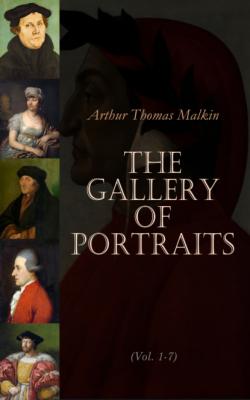The Gallery of Portraits (Vol. 1-7). Arthur Thomas Malkin
Читать онлайн.| Название | The Gallery of Portraits (Vol. 1-7) |
|---|---|
| Автор произведения | Arthur Thomas Malkin |
| Жанр | Документальная литература |
| Серия | |
| Издательство | Документальная литература |
| Год выпуска | 0 |
| isbn | 4064066400354 |
It is difficult within our contracted limits to give an accurate character of Voltaire. In versatility of powers, and in variety of knowledge, he stands unrivalled: but he might have earned a better and more lasting name, had he concentrated his talents and exertions on fewer subjects, and studied them more deeply. It has been truly and wittily observed that “he half knew every thing, from the cedar of Lebanon to the hyssop on the wall; and he wrote of them all, and laughed at them all.” Of the feeling of veneration, either for God or man, he seems to have been incapable. He thought too highly of himself to look up to any thing. Capricious, passionate, and generally selfish, he was yet accessible to sudden impulses of generosity. He was an acute rather than a subtle thinker. Perhaps in the whole compass of his philosophical works there is not to be found one original opinion, or entirely new argument; but no man ever was endowed with so happy a facility for illustrating the thoughts of others, and imparting a lively clearness to the most abstruse speculations. He brought philosophy from the closet into the drawing-room. Eminently skilled to detect and satirize the faults and follies of mankind, his love of ridicule was too strong for his love of truth. He saw the ludicrous side of opinions in a moment, and often unfortunately could see nothing else. His alchymy was directed towards transmuting the imperfect metals into dross. All enthusiasm, eagerness of belief, magnifying of probabilities through the medium of excited feeling, all that makes a sect as well in its author as its followers, these things were simply foolish in his estimation. It is impossible to gather from his works any connected system of philosophy: they are full of contradictions; but the pervading principle which gives them some form of coherence is a rancorous aversion to Christianity. As a Deist believing in a God, “rémunérateur vengeur,” but proscribing all established worship, Voltaire occupies a middle position between Rousseau on the one hand, who, while he avowed scepticism as to the proofs, professed reverence for the characteristics of Revealed Religion, and Diderot on the other, with his fanatical crew of Atheists, who laughed not without reason at their Patriarch of Ferney, for imagining that he, whose life had been spent in trying to unsettle the religious opinions of mankind, could fix the point at which unbelief should stop. The dramatic poems of Voltaire retain their place among the first in their language, but his other poetical works have lost much of the reputation they once enjoyed. He paints with fidelity and vividness the broad lineaments of passion, and excels in that light, allusive style, which brings no image or sentiment into strong relief, and is therefore totally unlike the analytic and picturesque mode of delineation, to which in this country, and especially in this age, we are apt to limit the name and prerogatives of imagination. As a novelist, he has seldom been equalled in wit and profligacy. As an historian, he may be considered one of the first who authorized the modern philosophizing manner, treating history rather as a reservoir of facts for the illustration of moral science, than as a department of descriptive art. He is often inaccurate, and seldom profound, but always lively and interesting. On the whole, however the general reputation of Voltaire may rise or fall with the fluctuations of public opinion, he must continue to deserve admiration as
“The wonder of a learned age; the line
Which none could pass; the wittiest, clearest pen;
The voice most echoed by consenting men;
The soul, which answered best to all well said
By others, and which most requital made.”—Cleveland.
Engraved by J. Posselwhite. RUBENS. From the original Picture by himself, in His Majesty’s Collection. Under the Superintendance of the Society for the Diffusion of Useful Knowledge. London, Published by Charles Knight, Pall Mall East.
RUBENS.
The father of this great painter was a magistrate of Antwerp, who, during the desperate struggle of the Netherlands to shake off the dominion of Spain, retired from his own city to Cologne, to escape from the miseries of war. There, in the year 1577, Peter Paul Rubens was born. At an early age he gave
